Lasswell Harold D. The Political Writings of Harold D. Lasswell
Подождите немного. Документ загружается.

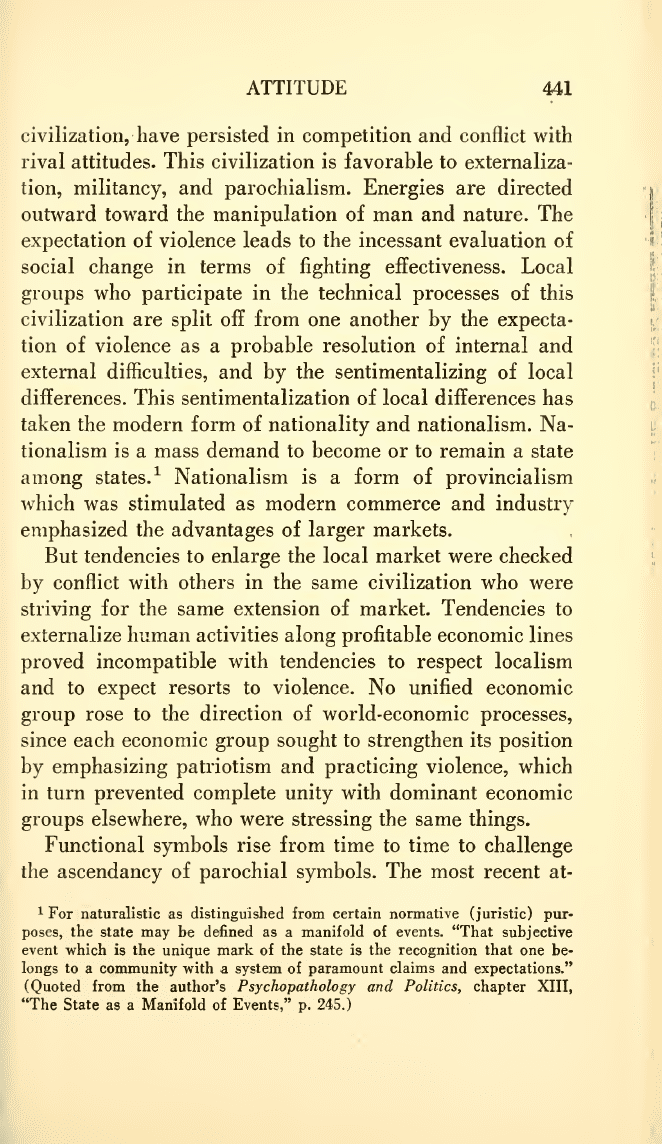
ATTITUDE
441
civilization, have persisted in competition
and conflict with
rival attitudes. This civilization
is
favorable
to externaliza-
tion, militancy, and parochialism. Energies are
directed
outward toward the manipulation
of
man and
nature. The
expectation of violence leads
to
the incessant evaluation
of
social change in terms
of
fighting effectiveness.
Local
groups who participate in the technical processes
of
this
civilization
are split off from one another
by
the
expecta-
tion of violence
as a
probable resolution
of
internal
and
external difficulties, and
by
the sentimentalizing
of local
differences. This sentimentalization
of local
differences
has
taken the modern form
of
nationality
and
nationalism.
Na-
tionalism
is a mass demand to become
or to
remain a state
among states.^ Nationalism
is
a form of provincialism
which was stimulated as modern commerce and industry
emphasized the advantages of
larger
markets.
But
tendencies to enlarge the local market were
checked
by
conflict with others in the same civilization who were
striving for the same extension of market. Tendencies
to
externalize human activities along profitable
economic lines
proved incompatible
with tendencies
to
respect
localism
and to
expect resorts
to
violence.
No
unified
economic
group rose to the
direction of world-economic
processes,
since
each
economic group sought
to
strengthen
its position
by
emphasizing patriotism and practicing
violence, which
in turn prevented complete unity with dominant
economic
groups elsewhere, who were stressing
the same
things.
Functional symbols rise from time to time
to challenge
the ascendancy of parochial symbols. The most
recent at-
1
For naturalistic
as
distinguished
from
certain normative (juristic)
pur-
poses, the state may
be
defined
as a
manifold
of
events. "That
subjective
event
which is the unique mark of the
state
is
the recognition
that one
be-
longs to
a
community with
a
system
of
paramount claims
and expectations."
(Quoted from the author's
Psychopathology
and
Politics,
chapter
XIII,
"The State as
a
Manifold of Events,"
p.
245.)
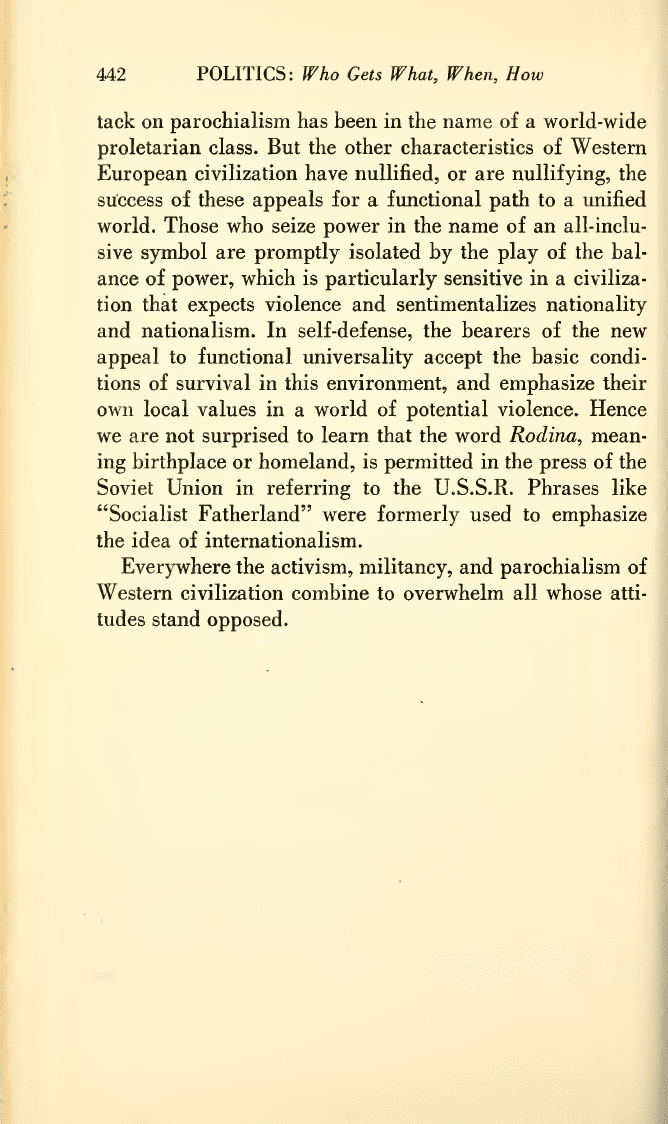
442
POLITICS: Who Gets What, When, How
tack
on parochialism has
been
in the name of
a
world-wide
proletarian class. But
the other characteristics
of Western
European civilization
have
nullified,
or
are nullifying,
the
success
of
these appeals for
a
functional path to a unified
world. Those who seize
power
in the name of an
all-inclu-
sive symbol
are promptly
isolated by the
play
of
the bal-
ance of power,
which is particularly
sensitive
in
a
civiliza-
tion
that expects violence and sentimentalizes nationality
and nationalism. In self-defense, the bearers of the new
appeal to functional universality accept the basic condi-
tions of survival in
this
environment, and
emphasize
their
own
local values in a
world of
potential
violence. Hence
we
are
not
surprised
to
learn that
the
word Rodina,
mean-
ing birthplace
or
homeland, is permitted
in
the press of
the
Soviet Union in referring to the
U.S.S.R.
Phrases
like
"Socialist Fatherland"
were
formerly
used
to emphasize
the idea
of
internationalism.
Everywhere
the activism,
militancy,
and
parochialism
of
Western civilization combine to overwhelm
all
whose atti-
tudes
stand opposed.
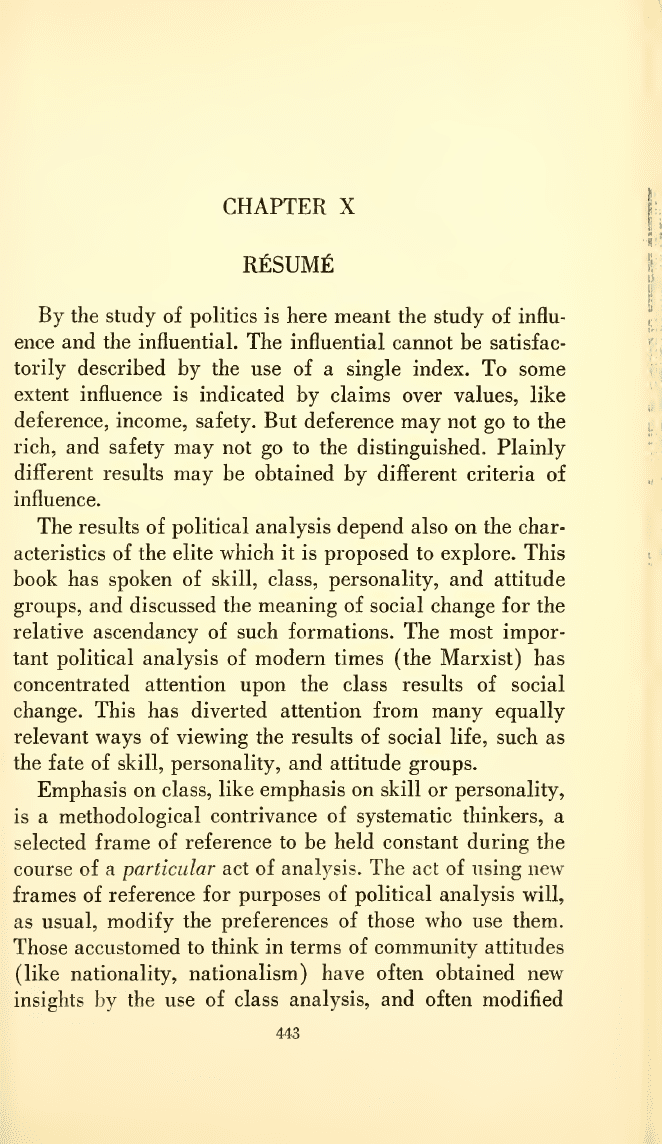
CHAPTER
X
R£SUM£
By
the
study of
politics is here
meant the study
of
influ-
ence and the influential.
The influential
cannot
be satisfac-
torily
described
by the use of
a single index.
To some
extent
influence is
indicated
by claims over values,
like
deference,
income,
safety. But
deference may not
go to the
rich,
and safety
may not
go
to
the distinguished. Plainly
different
results
may be
obtained by different criteria
of
influence.
The results of
political analysis depend
also on the char-
acteristics of the
elite which it is proposed
to
explore.
This
book has
spoken
of
skill, class, personality,
and attitude
groups,
and discussed the
meaning
of social change for the
relative ascendancy of such formations. The most impor-
tant
political
analysis of modern
times
(the Marxist)
has
concentrated attention
upon the class results
of social
change. This has diverted attention from
many equally
relevant
ways of
viewing
the
results
of social life,
such as
the fate of skill, personality, and attitude
groups.
Emphasis on
class,
like emphasis on skill
or personality,
is a
methodological
contrivance of systematic
thinkers,
a
selected
frame
of
reference to
be
held constant during the
course of a
particular act of anaKsis.
The
act of using new
frames of
reference
for purposes of political analysis
will,
as usual,
modify the
preferences of those who use them.
Those
accustomed to
think in terms of community attitudes
(like nationality,
nationalism) have
often
obtained new
insights l)y the use
of class
analysis, and
often modified
443
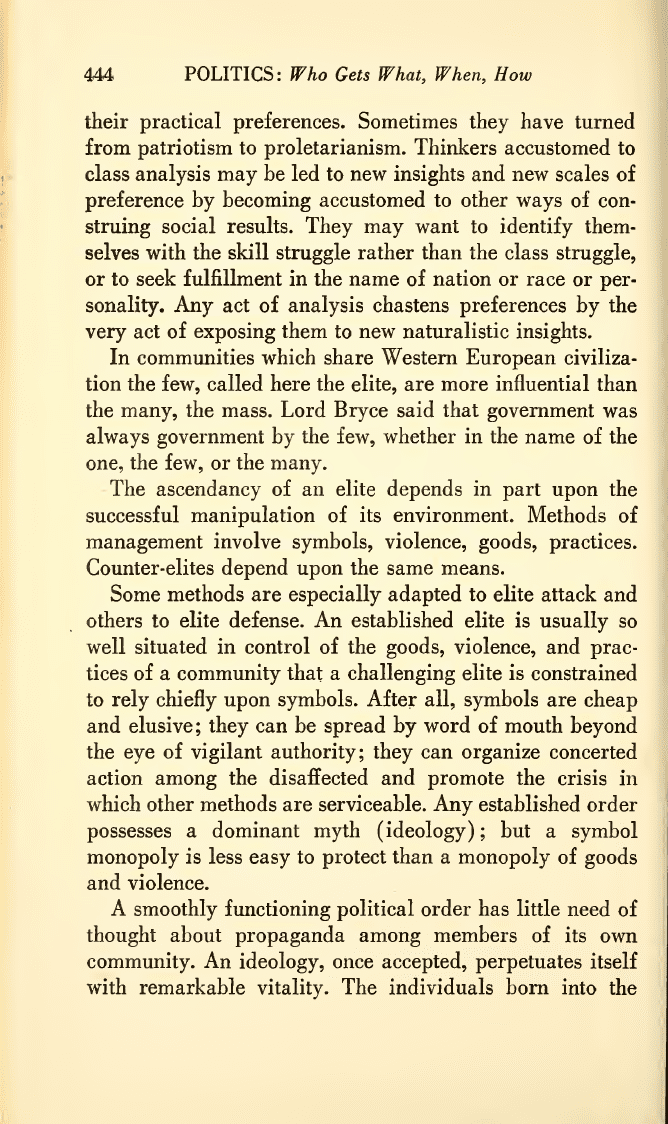
444
POLITICS: Who
Gets
What, When, How
their
practical preferences. Sometimes they
have turned
from patriotism to
proletarianism.
Thinkers accustomed
to
class analysis may be led to new insights and new scales
of
preference by becoming accustomed to
other
ways of con-
struing social results. They may want
to
identify
them-
selves with
the skill struggle rather than the class struggle,
or
to
seek fulfillment in the name
of
nation or race
or
per-
sonality. Any
act of
analysis chastens preferences
by the
very act
of exposing them
to
new naturalistic insights.
In
communities which share Western European
civiliza-
tion the
few,
called here the elite, are more influential
than
the many, the mass. Lord Bryce said that government
was
always
government
by
the few, whether in the
name of the
one,
the few, or the many.
The ascendancy of an elite depends in part
upon the
successful
manipulation
of
its environment.
Methods
of
management involve symbols, violence,
goods, practices.
Counter-elites depend upon the same means.
Some methods
are
especially adapted to elite attack
and
others to elite defense.
An
established elite
is
usually
so
well situated in control of the goods, violence, and
prac-
tices of
a
community
that
a
challenging
elite is constrained
to rely chiefly upon symbols.
After
all, symbols are
cheap
and elusive; they can be spread by word of mouth
beyond
the eye of vigilant
authority;
they can
organize
concerted
action among the
disaffected
and
promote
the crisis
in
which other methods are serviceable. Any
established order
possesses
a
dominant myth (ideology)
;
but
a symbol
monopoly is less easy to protect than a monopoly
of goods
and violence.
A smoothly functioning political order has little
need
of
thought about propaganda among members
of
its
own
community. An
ideology, once accepted, perpetuates
itself
with remarkable vitality. The individuals bom
into
the
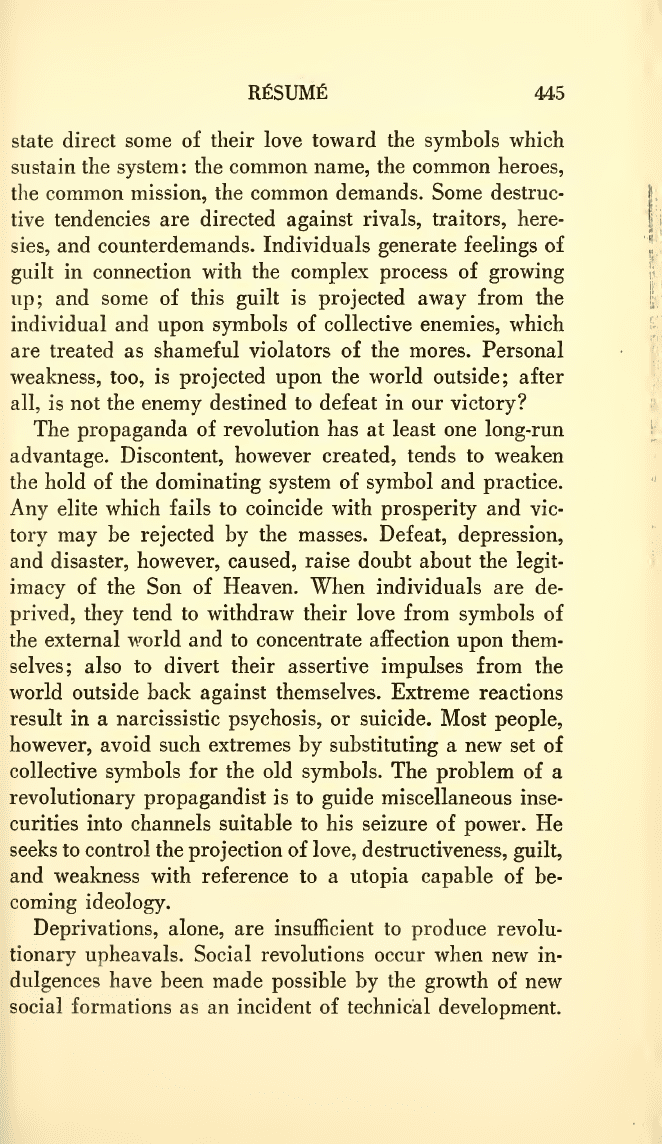
RfiSUMfi
445
state
direct
some
of
their love toward
the
symbols which
sustain the
system: the common name, the common heroes,
the common
mission, the common demands. Some destruc-
tive
tendencies are directed against rivals,
traitors,
here-
sies, and counterdemands.
Individuals generate feelings of
guilt in
connection
with
the complex process of growing
up; and some of
this guilt is projected away from the
individual and upon
symbols of collective enemies, which
are
treated as
shameful violators of the mores. Personal
weakness,
too, is
projected upon the world outside; after
all, is not the enemy
destined to defeat in our victory?
The propaganda of
revolution has at least
one long-run
advantage. Discontent,
however created, tends to
weaken
the hold of the
dominating system
of
symbol and practice.
Any elite which
fails
to
coincide with prosperity
and vic-
tory may be rejected by
the masses. Defeat,
depression,
and disaster, however, caused,
raise
doubt about the legit-
imacy of the Son of
Heaven. When
individuals are
de-
prived,
they tend to
withdraw their
love from symbols
of
the external
world
and to
concentrate
affection upon them-
selves; also to divert their assertive impulses from
the
world
outside
back
against themselves.
Extreme
reactions
result in
a
narcissistic psychosis, or suicide.
Most people,
however, avoid such
extremes
by substituting
a new set
of
collective symbols for the old symbols. The problem
of
a
revolutionary propagandist
is to guide miscellaneous
inse-
curities
into
channels suitable to his
seizure of power.
He
seeks
to
control
the
projection
of love, destructiveness,
guilt,
and weakness with reference
to a
Utopia
capable
of be-
coming
ideology.
Deprivations,
alone,
are
insufficient to produce
revolu-
tionary
upheavals. Social revolutions occur when
new in-
dulgences
have been made possible
by
the growth
of new
social
formations
as an incident of
technical
development.
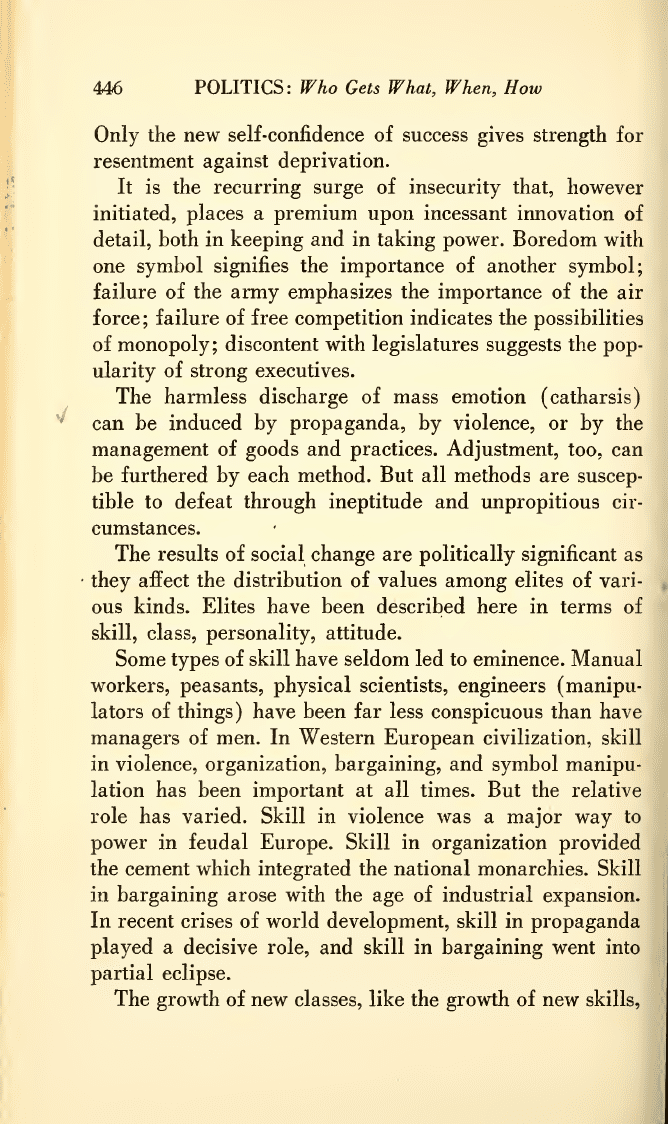
446
POLITICS:
Who
Gets
What,
When, How
Only the new
self-confidence
of
success
gives strength
for
resentment against deprivation.
It is the
recurring surge
of insecurity that,
however
initiated, places a
premium
upon
incessant
innovation
of
detail, both
in keeping and in taking power.
Boredom with
one
symbol signifies the importance of another
symbol;
failure of the army emphasizes the importance of
the air
force;
failure of
free
competition indicates the possibilities
of monopoly;
discontent with legislatures
suggests the
pop-
ularity of strong
executives.
The
harmless discharge of mass emotion
(catharsis)
can be
induced by propaganda,
by
violence,
or by the
management
of
goods
and practices. Adjustment,
too, can
be furthered by
each method. But all methods are
suscep-
tible
to
defeat through ineptitude and impropitious cir-
cumstances.
The
results of
social
change are politically significant as
they affect the
distribution
of
values
among elites
of
vari-
ous kinds.
Elites
have been described here in terms
of
skill, class,
personality,
attitude.
Some types of
skill
have
seldom
led to eminence. Manual
workers, peasants, physical scientists,
engineers (manipu-
lators of things)
have
been far less conspicuous
than have
managers of men. In Western European civilization, skill
in violence, organization, bargaining, and symbol manipu-
lation has been
important
at all times. But the relative
role
has
varied. Skill in violence
was a major
way
to
power in feudal Europe. Skill in organization
provided
the cement which integrated the national monarchies. Skill
in bargaining
arose
with
the age of industrial expansion.
In recent crises
of
world development, skill
in
propaganda
played a decisive role, and skill in bargaining went into
partial eclipse.
The growth
of
new classes, like
the
growth
of new
skills.
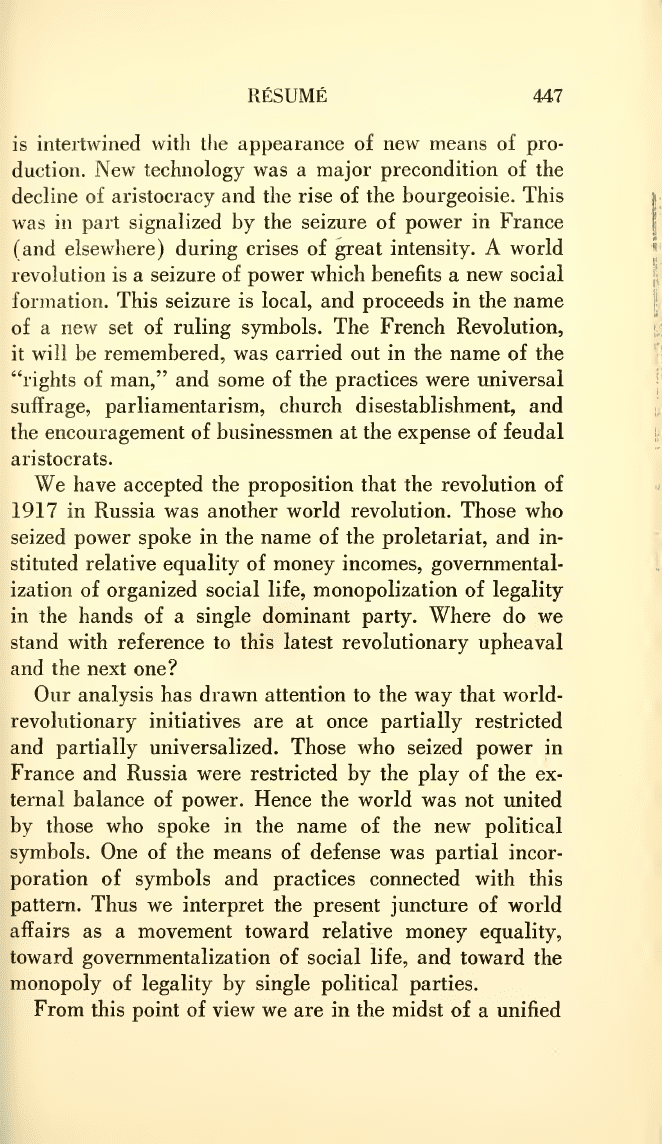
RESUME
447
is
intertwined
with the appearance
of
new
means
of pro-
duction.
New
technology was
a
major
precondition
of the
decline of
aristocracy and
the
rise
of
the
bourgeoisie. This
was
in
part signalized by the seizure of
power in France
(and elsewhere)
during crises of great
intensity. A world
revolution is a
seizure of power which
benefits
a
new social
formation. This seizure is local, and proceeds in the name
of a
new set of ruling symbols. The
French Revolution,
it
will
be
remembered, was
carried
out in the name of the
"rights
of
man," and some of the
practices
were universal
suffrage, parliamentarism,
church disestablishment,
and
the encouragement of
businessmen
at the
expense of
feudal
aristocrats.
We have accepted the
proposition
that the
revolution
of
1917 in Russia was
another world revolution.
Those who
seized power
spoke
in the
name
of
the proletariat,
and in-
stituted relative equality of money incomes, govemmental-
ization
of organized social
life, monopolization
of legality
in
the hands of a
single dominant
party. Where do we
stand
with reference to
this latest revolutionary
upheaval
and the next
one?
Our analysis
has
drawn attention
to the way that world-
revolutionary initiatives are
at
once partially
restricted
and partially universalized. Those who
seized power in
France
and Russia
were
restricted
by
the play
of the ex-
ternal
balance of power. Hence the world
was not united
by
those
who
spoke in
the name
of
the
new political
symbols.
One of the means of defense
was
partial
incor-
poration
of symbols and practices connected with
this
pattern.
Thus we interpret the present juncture
of world
affairs
as a movement toward relative money
equality,
toward
govemmentalization of social life, and
toward
the
monopoly
of legality by single political parties.
From
this point
of
view
we are in
the midst
of
a
unified
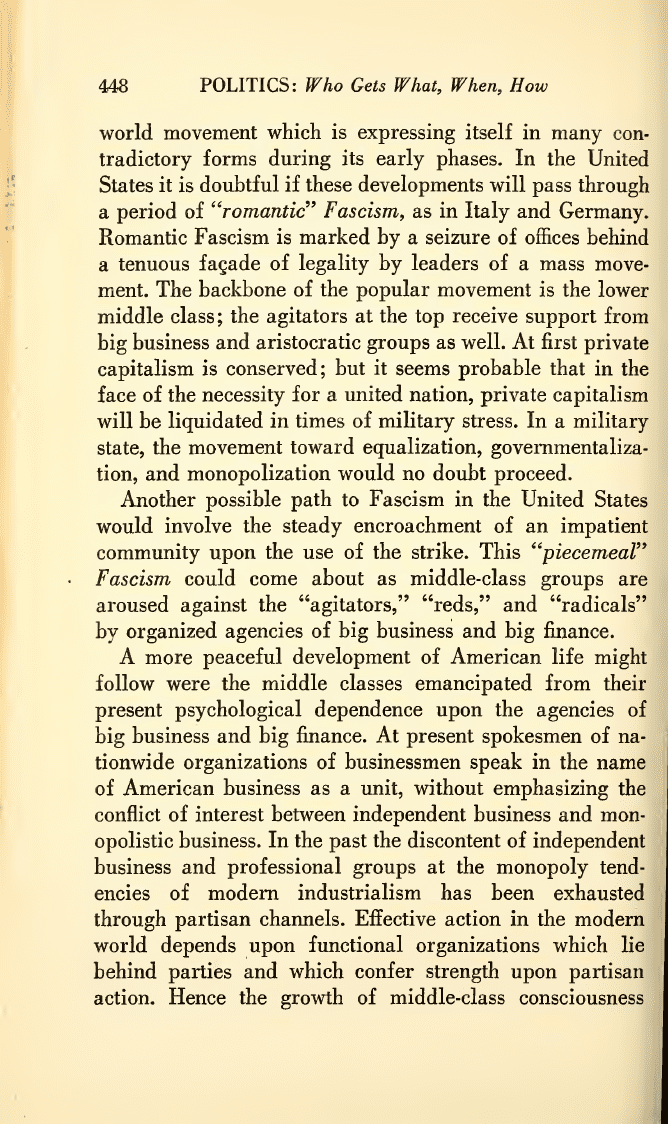
448
POLITICS:
Who Gets What, When,
How
world
movement
which is expressing
itself in many
con-
tradictory
forms
during
its
early phases. In
the
United
States
it is
doubtful if
these developments
will pass
through
a
period of
"romantid" Fascism,
as
in Italy
and
Germany.
Romantic
Fascism
is marked by
a
seizure
of
offices
behind
a
tenuous
fagade
of legality by leaders
of a mass
move-
ment.
The
backbone of the popular movement
is the
lower
middle
class;
the agitators at the top receive support
from
big
business and
aristocratic groups
as
well. At first
private
capitalism is
conserved; but
it
seems probable that
in the
face of
the
necessity
for
a
united
nation, private capitalism
will
be
liquidated in
times
of military stress. In a military
state,
the
movement
toward equalization,
govemmentaliza-
tion, and
monopolization would
no doubt proceed.
Another possible
path
to
Fascism in
the United States
would
involve the steady
encroachment
of an impatient
community upon
the use
of
the strike. This
^'
piecemeaV^
Fascism
could come about as
middle-class
groups
are
aroused
against
the "agitators," "reds," and
"radicals"
by
organized
agencies of
big
business
and
big
finance.
A more
peaceful development of American
life might
follow
were the
middle classes emancipated
from their
present
psychological dependence upon the
agencies of
big
business and
big
finance. At present spokesmen
of na-
tionwide
organizations of businessmen speak in
the name
of
American
business
as a
unit,
without emphasizing
the
conflict of interest
between independent
business and mon-
opolistic
business. In the past the discontent
of independent
business
and professional
groups
at the monopoly
tend-
encies
of modem
industrialism
has been exhausted
through
partisan channels. Effective action
in the modern
world depends
upon functional organizations which lie
behind parties and which
confer strength
upon
partisan
action.
Hence the growth of middle-class consciousness
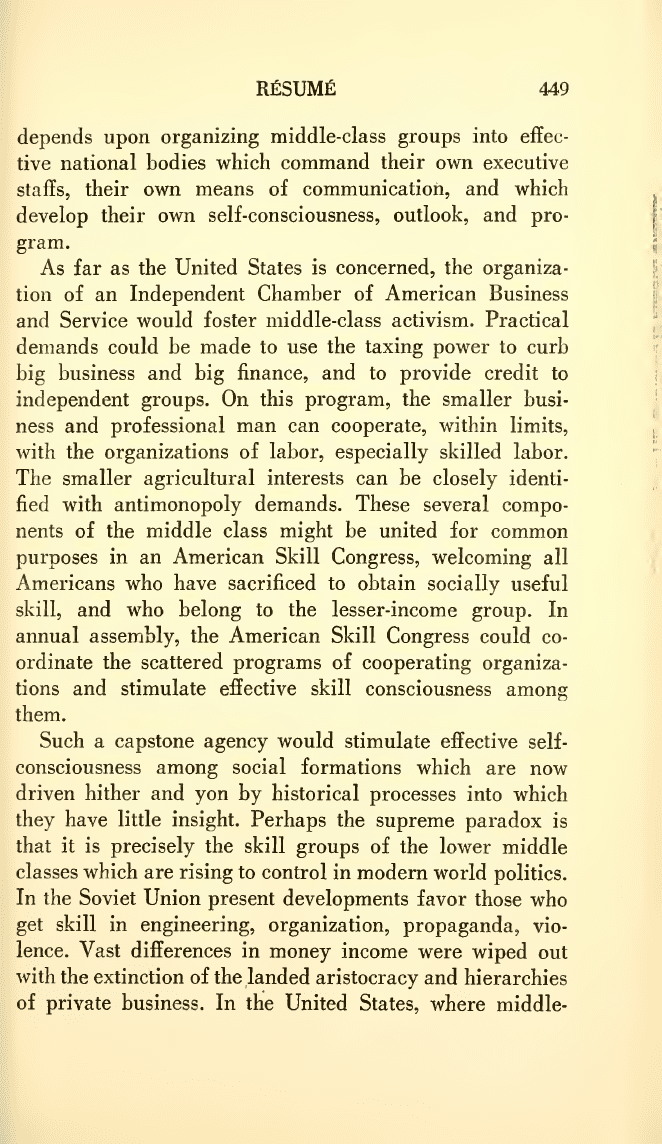
RfiSUMfi 449
depends
upon
organizing middle-class
groups into effec-
tive
national
bodies which
command
their
own executive
staffs, their
own means of
communication, and which
develop their
own
self-consciousness, outlook, and pro-
gram.
As far as the
United States is
concerned, the organiza-
tion of an
Independent
Chamber
of
American
Business
and Service would
foster middle-class
activism.
Practical
demands could be made to
use the
taxing
power to curb
big business and
big finance, and to provide credit
to
independent
groups.
On
this
program,
the smaller
busi-
ness and professional
man can cooperate, within
limits,
with the
organizations of labor, especially skilled
labor.
The smaller
agricultural interests can
be closely
identi-
fied with
antimonopoly demands. These
several
compo-
nents
of the
middle class might
be
united
for
common
purposes in
an American Skill
Congress, welcoming
all
Americans who have
sacrificed
to obtain socially
useful
skill, and who belong to the lesser-income
group.
In
annual assembly, the American Skill Congress
could
co-
ordinate
the scattered
programs
of cooperating
organiza-
tions and
stimulate effective
skill
consciousness
among
them.
Such
a
capstone
agency would
stimulate effective
self-
consciousness among social
formations
which
are
now
driven hither and yon
by historical
processes into
which
they have
little
insight.
Perhaps the
supreme
paradox
is
that
it is precisely
the
skill
groups
of the lower
middle
classes which
are rising to
control in modem
world
politics.
In the
Soviet Union present
developments
favor
those
who
get skill in
engineering, organization,
propaganda,
vio-
lence.
Vast differences
in money
income
were
wiped
out
with
the
extinction of the
landed aristocracy
and
hierarchies
of private
business. In the United
States,
where
middle-
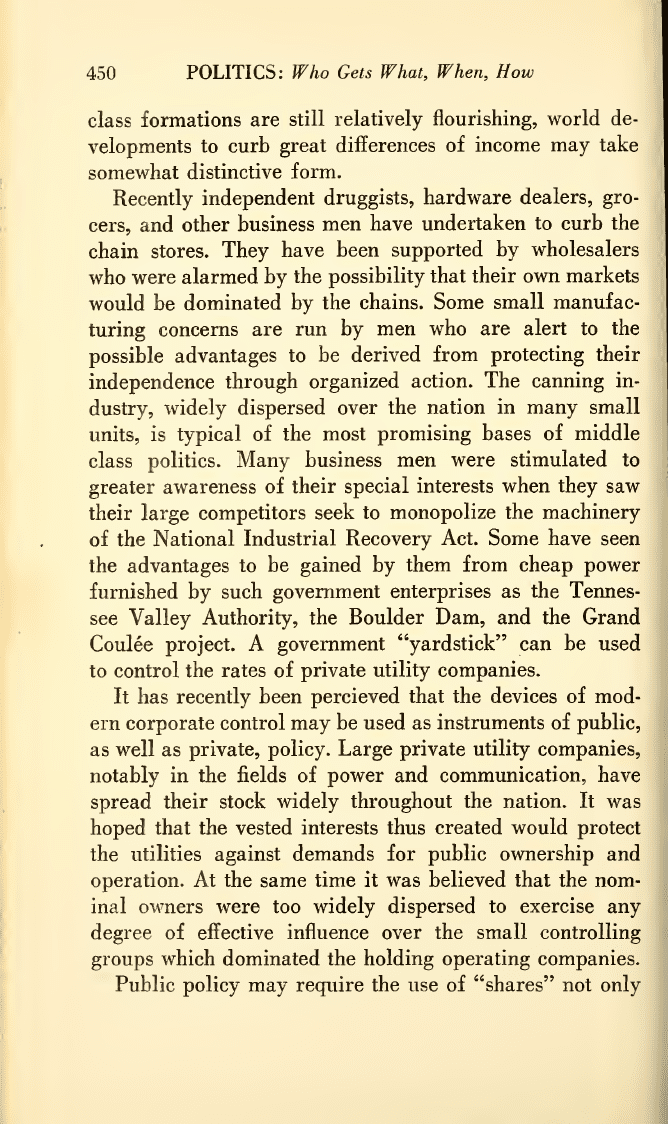
450
POLITICS:
Who Gets What,
When, How
class
formations
are
still relatively
flourishing, world
de-
velopments
to
curb
great
differences of
income may take
somewhat
distinctive
form.
Recently
independent
druggists,
hardware dealers,
gro-
cers, and
other
business
men have
undertaken
to curb the
chain
stores.
They
have
been
supported by
wholesalers
who
were alarmed
by
the
possibility that
their own markets
would be
dominated by
the
chains. Some
small manufac-
turing
concerns
are run by
men who
are alert
to
the
possible
advantages
to be
derived from
protecting their
independence
through
organized
action. The canning in-
dustry,
widely
dispersed
over the nation
in many small
units,
is
typical of the
most
promising
bases
of middle
class
politics.
Many
business men were
stimulated
to
greater
awareness of
their special
interests when they
saw
their large
competitors
seek to
monopolize the machinery
of
the
National
Industrial Recovery
Act. Some have seen
the advantages
to be
gained by
them from cheap
power
furnished by
such
government enterprises as
the Tennes-
see Valley
Authority,
the Boulder Dam, and the Grand
Coulee
project. A
government "yardstick" can
be
used
to control
the rates of
private utility companies.
It has
recently been
percieved that the
devices
of mod-
ern corporate control may be
used as
instruments
of public,
as
well
as
private,
policy. Large private
utility
companies,
notably in the fields of power
and communication, have
spread their stock
widely throughout the
nation. It
was
hoped that
the vested interests thus
created would protect
the utilities against demands for
public ownership
and
operation. At the same
time
it was
believed that the
nom-
inal
owners were too widely dispersed to
exercise
any
degree
of
effective influence over the
small
controlling
groups which dominated the
holding operating companies.
Public policy
may
require the use of "shares" not only
